Género e inclusión
El género, la edad, las capacidades y otras características individuales o específicas del contexto presentan diferentes oportunidades y retos para proporcionar PTM a las personas en crisis de forma digna.
Los agentes humanitarios reconocen cada vez más las necesidades y limitaciones específicas de las personas con capacidades diferentes, las personas mayores, las personas de distinto sexo, en particular las mujeres, y las personas en movimiento. Paralelamente, se aprecia cada vez más la necesidad de adoptar medidas adaptadas y sensibles que garanticen su inclusión efectiva.
Apoyar las necesidades de las diversas personas con PTM va más allá de convertirlas en un grupo objetivo; se trata de un compromiso significativo, un diseño y una implementación intencionados, y un ajuste del programa para satisfacer las necesidades de los diferentes grupos con dignidad. Los enfoques inclusivos van de la mano de la ayuda centrada en las personas.
Prioridades actuales
La CALP Network seguirá animando a los actores de los programas de transferencias monetarias a que amplíen su enfoque para ser más inclusivos y defiendan una comprensión más completa de cómo los PTM pueden ir más allá de la noción de “no hacer daño” para abordar adecuadamente las necesidades de personas diversas de manera segura y digna.
Trabajaremos para elevar las experiencias e iniciativas sobre PTM y género, PTM inclusivos de la discapacidad, trabajando con diferentes etnias e identidades culturales, grupos minoritarios, personas con diversas identidades sexuales y grupos de edad.
CALP también se esforzará por hacer su trabajo lo más accesible posible.
Contenido destacado

La CALP Network & CARE: Módulo sobre los Programas de Transferencias Monetarias (PTM) y Género
Blog Post
Este video ofrece una visión general de la relación entre el género y los programas de transferencias monetarias (PTM) estructurada en torno al ciclo del proyecto humanitario, que incluye: Evaluación y análisis de la respuesta: cómo ajustar los procesos de evaluación para lograr un reflejo más preciso del género y los mercados. Diseño y ejecución: cómo utilizar métodos y...

Presentación: Módulo sobre Programas de Transferencias Monetarias (PTM) y Género
Presentación
Esta presentación de diapositivas es parte del primer vídeo de micro aprendizaje de CALP Network en español, realizado en colaboración con CARE. Este módulo de micro aprendizaje ofrece un panorama general de la relación entre el género y los Programas de Transferencias Monetarias (PTM) organizado en torno al ciclo de proyecto humanitario, y forma parte del curso en línea en español de...
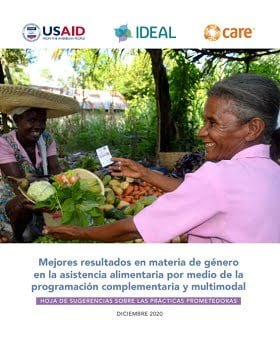
Mejores resultados en materia de género en la asistencia alimentaria por medio de la programación complementaria y multimodal: hoja de sugerencias sobre las prácticas prometedoras
Guía y herramientas
Esta hoja de sugerencias es un extracto del informe de investigación «Mejores resultados en materia de género en la asistencia alimentaria por medio de la programación complementaria y multimodal». Con el estudio, se intentó responder a la pregunta «¿De qué manera los procesos de diseño, implementación y supervisión de proyectos mediante el uso de modalidades combinadas mejoran los...
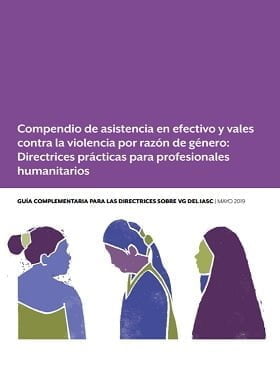
Compendio de asistencia en efectivo y vales contra la violencia por razón de género: Directrices prácticas para profesionales humanitarios
Guía y herramientas
El propósito de este compendio de asistencia en efectivo y vales (AEV) y violencia por razón de género (VG) es ayudar a los actores humanitarios y a las comunidades afectadas por crisis y violencia a: integrar la mitigación de riesgos de VG en las intervenciones AEV; integrar la prevención de VG en la programación multisectorial usando AEV cuando corresponda; integrar la AEV en la...

Programación de Transferencias Monetarias Que Funciona Para Mujeres: 6 Lecciones del Terreno
Informe
En la actualidad, la Programación de Transferencias Monetarías que funciona para mujeres (PTM) es una herramienta común entre las acciones humanitarias y se usa para satisfacer las diversas necesidades de las personas desplazadas por crisis y conflictos con mayor dignidad.1 Aunque existe evidencia cada vez mayor sobre el efecto de la PTM en el bienestar y el poder de las mujeres2, en la...
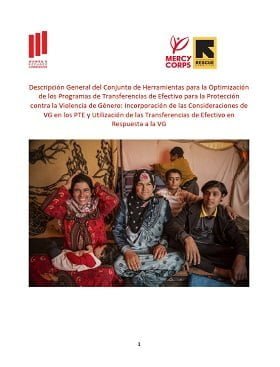
Conjunto de Herramientas para la Optimización de los Programas de Transferencias de Efectivo para la Protección contra la Violencia de Género
Guía y herramientas
De 2016 a 2018, la Comisión de Mujeres Refugiadas (WRC) emprendió un proyecto para desarrollar la capacidad que los actores humanitarios tienen para integrar la protección en los Programas de Transferencias de Efectivo (PTE) y para utilizar los PTE para los resultados de protección, específicamente la protección contra la Violencia de Género (VG). El proyecto, “Optimización de los...
Últimos recursos

Review of Food for Peace Market-Based Emergency Food Assistance Programs: Democratic Republic of Congo Case Study Report
Report
The Democratic Republic of Congo (DRC) case illustrates the complexity and diversity of contexts within which program design and implementation occurs. It highlights the need for provincial-scale assessments, local market monitoring, and flexibility to pivot to different modalities depending on changing...
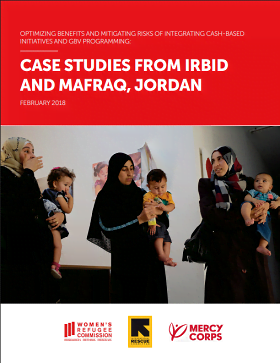
Optimizing Benefits and Mitigating Risks of Integrating Cash-Based Initiatives and GBV Programming: Case Studies from Irbid and Mafraq, Jordan
Report
This case study provides an overview of assessment and monitoring activities
conducted by Mercy Corps and the International Rescue Committee in partnership with the Women’s Commission to:
a. mainstream gender-based violence (GBV) considerations in cash-based interventions
b. utilize cash within a GBV...
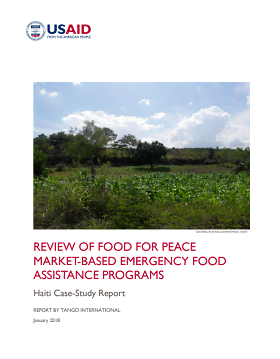
Review of Food for Peace Market-Based Emergency Food Assistance Programs: Haiti Case-Study Report
Report
Haiti is a very low-income country with a degraded ecological setting that faces repeated threats from multiple hazards. It is an excellent example of Food for Peace (FFP) linking emergency and development funding through the Kore Lavi Title II program that serves as a model for the national social...
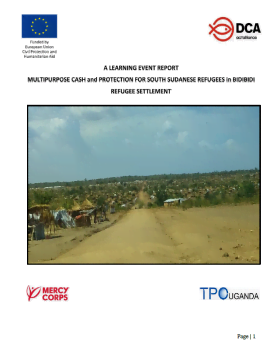
Multi-purpose Cash and Protection for South Sudanese Refugees in Bidibidi Refugee Settlement: A Learning Event Report
Report
This paper will present evidence on how cash transfers empowers conflict affected populations. The evidence is based on two projects implemented by DCA in Bidibidi Refugee Settlement in Uganda. Furthermore, the paper present evidence on how the two projects successfully linked cash and protection. 14, 520...

Review of Food for Peace Market-Based Emergency Food Assistance Programs: Jordan/Turkey Case Study Report
Report
Syria regional crisis: The response to the Syria regional crisis exemplifies the challenges and opportunities involved with delivering food assistance in a widespread, largely urban refugee and internally displaced persons (IDP) crisis affecting middle-income countries. This case study focuses on...
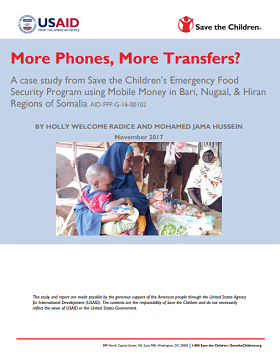
More Phones, More Transfers? A case study from Save the Children’s Emergency Food Security Program using Mobile Money in Bari, Nugaal, & Hiran Regions of Somalia
Report
In 2016-2017, with funding from USAID/FFP, Save the Children implemented a project targeting over 10,000HH the Bari, Nugaal, and Hiran regions of Somalia with monthly cash transfers using Mobile Money a partnership with Golis and Hormuud. The project sought to improve the food security situation in the...

Final Evaluation of the DiRECT Response Emergency Cash Transfer Programme in Zambia
Report
In the past two years (2015 and 2016), Zambia experienced relatively harsh climatic conditions characterised by disruptive rains and the negative impact of El Nino weather patterns. Districts in the southern and western regions of the country were most affected. Many farmers in the affected regions were...
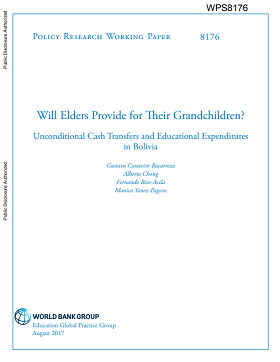
Will Elders Provide for Their Grandchildren? Unconditional Cash Transfers and Educational Expenditures in Bolivia
Report
This paper takes advantage of repeated cross-section household surveys and a sharp discontinuity created by the introduction of an unconditional cash transfers to elders.The paper evaluates the impact of these cash transfers on the educational expenditures for children within a household. The analysis...

Early Lessons Learnt from Cash Transfer Interventions in Post Matthew Haiti
Report
This technical report has twofold purposes, firstly to describe the main international evidence on cash transfer programing pertinent for the Haitian post Matthew emergency context; and secondly, to document the main lessons that can be learnt from the UNDP post Matthew cash transfer intervention. The...
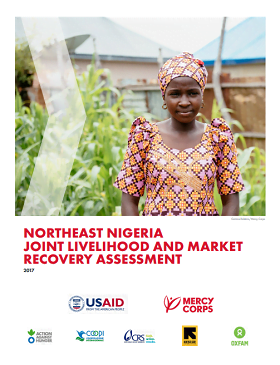
Northeast Nigeria joint livelihoods and market recovery assessment
Report
Mercy Corps Nigeria, in conjunction with Action Against Hunger, Cooperazione Internazionale, Catholic Relief Services, the International Rescue Committee and Oxfam undertook the assessment across the three most affected states in Northeast Nigeria; Adamawa, Borno and Yobe, to better understand...
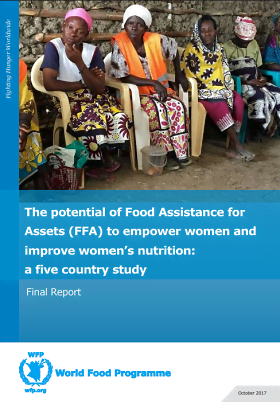
The Potential of Food Assistance for Assets (FFA) to Empower Women and Improve Women’s Nutrition: a five country study
Report
From June 2016 to April 2017, a five-country study to explore the potential of WFP’s Food Assistance for Assets (FFA) programmes to empower women and improve women’s nutrition was conducted by WFP. The purpose of the study was to: 1. Assess changes (outcomes or impacts) that relate to women’s...

Electronic Transfers in Humanitarian Assistance and Uptake of Financial Services
Report
The Electronic Cash Transfer Learning Action Network (ELAN) undertook case studies on humanitarian electronic transfer (‘e-transfer’) projects in Ethiopia, Zimbabwe and Bangladesh. The case studies examine the extent to which: recipients used digital financial services (e.g. money transfers, savings,...
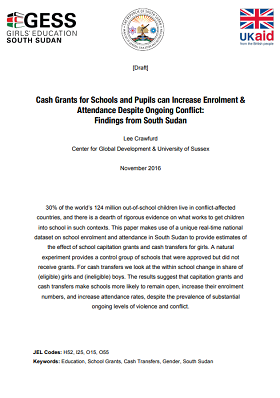
Cash Grants for Schools and Pupils can Increase Enrolment & Attendance Despite Ongoing Conflict: Findings from South Sudan
Report
This paper makes use of a unique, real-time national dataset on school enrolment and attendance in South Sudan to provide estimates of the effect of school capitation grants and cash transfers for girls.

Policy Briefing: Electronic Transfers in Humanitarian Assistance and Uptake of Financial Services
Report
The Electronic Cash Transfer Learning Action Network (ELAN) undertook case studies on humanitarian electronic transfer (‘e-transfer’) projects in Ethiopia, Zimbabwe and Bangladesh. The case studies examine the extent to which: recipients used digital financial services (e.g. money transfers, savings,...
The effect of financial aid from UK Aid Girls’ Education South Sudan programme and EU IMPACT programme to education in South Sudan in 2017
Report
This paper is an update to the previous Girls’ Education South Sudan working paper that looked at the effect of financial interventions (capitation grants and girl’s cash transfers) by Girls’ Education South Sudan, a collaboration of UK Aid and the Ministry of General Education and Instruction,...
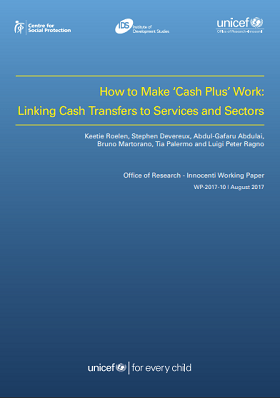
How to Make ‘Cash Plus’ Work: Linking Cash Transfers to Services and Sectors
Report
The broad-ranging benefits of cash transfers are now widely recognized. However, the evidence base highlights that they often fall short in achieving longer-term and second-order impacts related to nutrition, learning outcomes and morbidity.In recognition of these limitations, several ‘cash...

Cash for Education: A global review of UNHCR programmes in refugee settings
Report
This review provides an overview of the use of cash assistance in 45 cash-related education programmes in 21 UNHCR operations. It highlights the key opportunities and challenges with the use of cash for education and provides key direction for future programming and related protection considerations....

Humanitarian Cash Transfers in the Democratic Republic of the Congo: Evidence from UNICEF’s ARCC II Programme
Report
From March 2013 to September 2015, UNICEF and three partner organizations (Concern Worldwide, Mercy Corps, and Solidarités International), collaborated to deliver what was at the time the single-largest unconditional cash transfer programme for humanitarian response in the Democratic Republic of the...

Can Conditional Cash Transfers improve the uptake of nutrition interventions and household food security? Evidence from Odisha’s Mamata scheme
Report
There is considerable global evidence on the effectiveness of cash transfers in improving health and nutrition outcomes; however, the evidence from South Asia, particularly India, is limited. In the context of India where more than a third of children are undernourished, and where there is considerable...
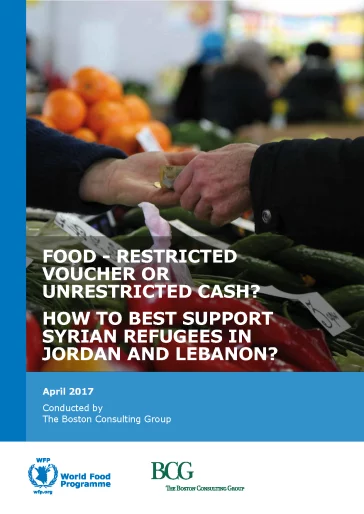
Food – Restricted Voucher or Unrestricted Voucher Cash? How to Best Support Syrian Refugees in Jordan and Lebanon?
Report
The World Food Programme (WFP) plays a pivotal role in the food security of Syrian refugees within the Syria +5 region. WFP periodically reviews its operational approach, so it is timely to consider what the best modality for the next phase of the response might be, including the pros and cons of...


